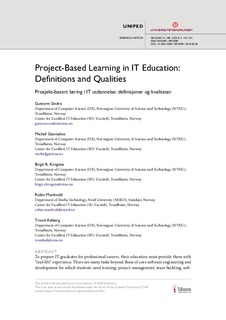Project-Based Learning in IT Education: Definitions and Qualities
Sindre, Guttorm; Giannakos, Michail; Krogstie, Birgit Rognebakke; Munkvold, Robin Isfold; Aalberg, Trond
Journal article, Peer reviewed
Published version
Permanent lenke
http://hdl.handle.net/11250/2501442Utgivelsesdato
2018Metadata
Vis full innførselSamlinger
Sammendrag
To prepare IT graduates for professional careers, their education must provide them with “real-life” experience. There are many tasks beyond those of core software engineering and development for which students need training: project management, team building, software estimation and planning, progress tracking, and communication. Project-based learning offers ways to transfer learning of foundational and practical knowledge into “real projects for real clients”. The emphasis on projects in IT education follows naturally from the fact that projects are the main working style in the IT industry. IT study programs maintain a share of more traditional courses in which the dominant learning activities are textbook reading, lectures and weekly exercises, so the education as such is not fully project-based. Furthermore, it is difficult to turn to an entirely project-based style when there are compulsory courses from different disciplines, for instance generic mathematics courses with a huge number of students. Hence, despite the numerous benefits of project-based learning, several practical challenges need to be addressed when implementing this strategy in a hybrid educational context. The question posed in this article is: How can project-based courses be implemented under different educational contexts to support IT students’ gradual development into professional practitioners? Projects can be extended between or across different courses in different ways, each with potential advantages and challenges. For instance, projects can be supported in the contemporary learning systems for fast feedback and continuous monitoring of the progress. Projects can also be shared among several courses taking place in the same semester, or among courses taking place in consecutive semesters. Even more radically – extrapolating the idea of a student e-portfolio – one could consider each student’s entire university education as a project, the project goals being the learning goals for the study program in question, and single courses being considered as work packages contributing to these overall goals. This might motivate students and allow them to appreciate the whole picture rather than looking at courses as narrow and isolated achievements with a strong focus on exams and grades. The paper provides a classification of different ways in which project learning can be taken beyond the single course context even in study programs where it is (at least in the short term) unavoidable to have a mixture of projects and more traditional teaching.

